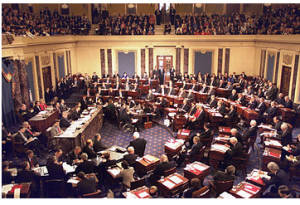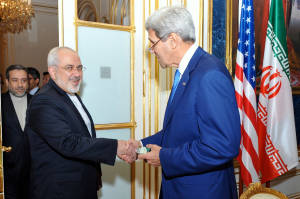As the deadline for a deal with Iran nears and as talks have yet to produce a diplomatic solution, the US Senate is preparing for the day after.

US senate (Photo: edusolution.com)
Amid much controversy in the media and vigorous opposition by the Obama administration, the US Senate submitted the Nuclear Weapon Free Iran Act of 2015 on Tuesday, a bill that promotes the placing of further sanctions on Iran if the negotiations between the P5+1 powers and Iran fail.
The bill was introduced by Senators Mark Kirk (R-IL) and Robert Menendez (D-NJ), with an additional 14 co-sponsors. The list includes Senate Majority Leader Mitch McConnell (R-KY) and six other Democrats. They hope to enlarge the list in the near future.
Caving in to Pressure
However, Menendez, caving in to pressure and falling in line with his party, promised to hold off on a final vote on the bill until March 24. Menendez sent a letter to the White House on Tuesday morning, together with nine other Democratic Senators, promising that they “will not vote for this legislation on the Senate floor” before that date.
The bill stipulates the leveling of further sanctions against Iran after the June 30th deadline, including to “close loopholes in existing petroleum sanctions, enhance sanctions on Iran’s oil trade and financial transactions, and impose further sanctions on Iran’s senior government officials, family members and other individuals for weapons of mass destruction proliferation, terrorism sponsorship and other illicit activities, and on Iran’s shipbuilding, automotive, construction, engineering and mining sectors.”
Obama Repeatedly Opposes Bill
Lawmakers fear that the Obama administration may settle for what could result in a bad deal with Iran. The bill further requires Senate approval for any agreement between Washington and Tehran.
President Barack Obama has repeatedly opposed the bill, claiming that it hinders the possibility to achieve a diplomatic solution with Iran. He threatened to veto the bill if it is voted through in Congress. “There are no guarantees that negotiations will succeed, and I keep all options on the table to prevent a nuclear Iran. But new sanctions passed by this Congress, at this moment in time, will all but guarantee that diplomacy fails,” he said.
“It doesn’t make sense,” Obama said during his State of the Union address. “I will veto any new sanctions bill that threatens to undo this progress. The American people expect us to only go to war as a last resort.”
Deal with Iran Unlikely

US Secretary Kerry (R) and Iranian FM Zarif meet for negotiations. (Photo: Wikipedia)
Negotiators from Iran and the US, United Kingdom, France, Russia, China and Germany hope to arrive at an initial agreement by March 30 and to reach a final deal by June 30. Jerusalem is closely and anxiously monitoring these negotiations, fearing that the Iranians will walk away with an agreement with which they can still threaten Israel’s existence.
Prime Minister Benjamin Netanyahu has repeatedly declared that the agreement under formulation is “unacceptable to Israel” and has vowed to fight it vigorously in any way he can.
In the meantime, a senior Israel official stated on Monday that a deal with Iran is not likely to be achieved.
According to the official, who was quoted by the Jerusalem Post, significant differences remain between Iran and the P5+1, and it is difficult to see how it will be possible to overcome the Iranian demand for a removal of all the sanctions. He said that no one can say with certainty whether an agreement will be signed in the near future.
“There has still not been a deep Iranian change regarding the concessions that can bring them to an agreement,” the official said. “We are not seeing a strategic decision regarding concessions by [Supreme Leader Ayatollah Ali] Khamenei,” the official told the Post.
The official said that a crisis in the talks could definitely “sharpen the dilemma for the Iranians and help get to an agreement under better conditions.”
According to the senior diplomatic official, a combination of diplomatic pressure and economic leverage increases the chances for better results in the negotiations. He said that placing pressure on Iran does not guarantee that an agreement will be reached, but a lack of pressure would ensure that there will be no agreement.



